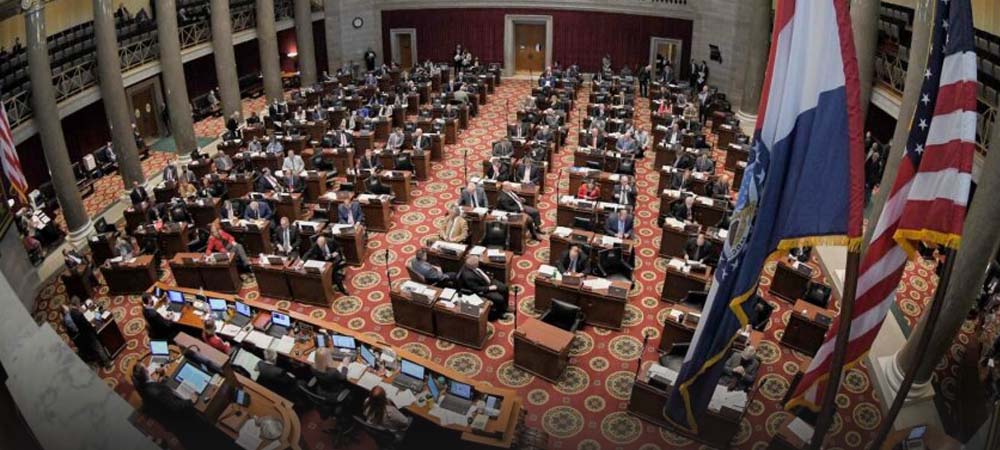- Missouri and Georgia have seen legalization bills continue to gain traction, with the former appearing ready to make a final vote while the latter is scrambling to get a sports betting bill through in time.
- Tennessee is looking to add a tax on operators’ handle rather than revenue as well as altering renewal fees for bigger operators.
- Connecticut is seeking to legislate regulations in colleges and universities to ban advertising and restrict sportsbooks’ influence on students.
WASHINGTON – Bills legalizing sports betting continue to makes waves in 2023, with Missouri and Georgia being some of the recent states to see introduced legislation. Meanwhile, states with existing sports betting markets like Tennessee and Connecticut are making changes to their laws to net more revenue or combat intrusive advertising.
Notably, both Missouri and Georgia have decided to not move forward with their previous senate bills instead opting for the similar House bills. Georgia’s prospects look grim due to senate opponents of the bill, though.
For Missouri sports betting, strides have been made in the past few weeks regarding HB556, a bill that would allow professional sports teams in the state to partner with exiting operators to launch up to three skins each. The bill also specifies an age minimum of 21 and taxes net winnings at 10%.
Democrat opponents of the bill sought to increase the tax rate for net winnings and/or eliminate deductions related to promotional costs, but were unable to alter the bill’s language before it was approved by the house.
The bill has been noted to have strong opposition in the Senate, mainly by Senator Denny Hoskins, who has a long history of disallowing sports betting bills without the inclusion of VLTs. This point of contention has been a major force in the effort to legalize and bill supporters frequently attempt to simply pass the bill as is and address VLTs at a later date.
Georgia Sports Betting
Georgia is similarly seeing some traction being gained through House Bill 237, which passed the State Economic Development and Tourism Committee last Thursday. With the current legislative session ending on March 29, there is quite a time crunch to push through and completing the entire process of legalization seems unlikely at this time.
This is mainly because two bills in the senate that appeared to have support were dismissed earlier in the month. However, there is confidence that it may get done in a later legislative session with House Speaker Jon Burns and Lt. Gov Burt Jones sharing the sentiment that eventually Georgia sports betting will be reconsidered.
Tennessee Sports Betting Revenue
Tennessee on the other hand is making progress on legislation that will change the current taxation model that exists for sports betting operators. As it currently stands, operators are taxed 20% of their revenue and a $750,000 initial payment followed by equivalent renewal fees for licenses.
HB1362 seeks to change this by instead taxing the handle of operators at 1.85% rather than the revenue, leading to about $15 million more tax revenue for Tennessee. The Senate counterpart of this bill instead states 2%, and has already passed a committee.
Importantly, the bill would also lower renewal licensing fees for operators that have lower handles, meaning that smaller casinos or platforms will end up paying less while bigger and more established sportsbooks will pay the same or more to keep renewing. The $750,000 initial payment is slated to remain though.
While the direction and confidence of the bills remain unclear, it is logical to assume that the Tennessee sports betting industry will see more regulation and legislative changes soon.
Connecticut Banning Sportsbook Adverts
Lastly, Connecticut has targeted sportsbooks advertising on college campuses, seeking to make the practice illegal. The language of the bill would restrict the ability of colleges/universities from sharing advertising-relevant information (phone numbers, email addresses, etc.) with sports betting companies.
HB5232 also regulates in-person attempts to advertise, allowing sports betting companies to host live events but not allowing them to directly solicit students.
While the likelihood of the bill passing is unclear, Connecticut sports betting has clearly become too predatory in the eyes of government officials. Protecting students and other vulnerable groups that have been shown to be at risk for gambling problems remains at the top of their legislative agenda.
Advertising Disclosure
In order to provide you with the best independent sports betting news and content LegalSportsBetting.com may receive a commission from partners when you make a purchase through a link on our site.
News tags: Burt Jones | Connecticut | CT HB 5232 | Denny Hoskins | GA HB 237 | Georgia | Jon Burns | Missouri | MO HB 556 | Tennessee | TN HB 1362

Jeremias is a current Florida State University student majoring in Editing, Writing and Media as well as Media/Communication studies. Primarily focused on the NFL, NBA, and NHL, Jeremias has a passion for sports statistics research that helps bettors find the blind spots in sportsbooks.


 College Football Betting
College Football Betting Best Online Sports Betting
Best Online Sports Betting Best Legal NFL Betting
Best Legal NFL Betting States With Legal Sports Betting
States With Legal Sports Betting Sports Betting Events
Sports Betting Events




